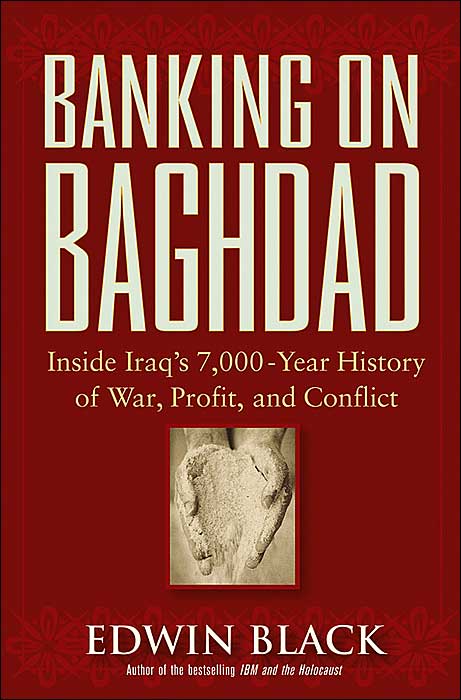 |
||
|
|
Join
The Miami Herald's Business Monday Book Club.
Click here for information.
Music Reviews and Features
Dion Dimucci
Lester Bangs in "Almost Famous"
History of Warner Brothers Music
Dining
Creolina's
Cajun/Creole
Edwin
Black paints detailed portrait of Iraq.
The
eternal relationship between commercial and political interests.
BY
RICHARD PACHTER
rpachter@wordsonwords.com
Automobile magnate and virulent anti-Semite Henry Ford
once famously declared ''History is bunk.'' At best, most Americans cast
a skeptical eye on history.
Though many regard the study of past events, policies and people as a
burden reserved for sometimes reluctant students, academics and Jeopardy
contestants, thoughtful people understand that if the lessons of history
go unheeded, they're bound to be repeated.
Presently, the United States is an occupying power in Iraq. Despite real
or imagined intentions and declarations, one has a feeling that not enough
attention has been paid to anything beyond recent history in that country.
That's unfortunate, but it still isn't too late to pick up Edwin Black's
powerful new study of Iraq's place in the world.
When analyzing world events, it's always wise to follow the money. Had
anyone bothered to delve into the history of the region originally called
Mesopotamia and known as ''the cradle of civilization,'' a panorama of
rising and falling civilizations, rulers, invaders and exploiters would
be obvious. The present situation is merely the latest example of attempted
commercial and political exploitation of the area by foreign powers. But
most every such endeavor was aided and promoted by natives, too.
Black's prose is solid and evocative throughout. His taut description
of the atrocities visited upon the region's Moslems, first by each other,
and later, Genghis Khan's Mongols, is vivid and chilling. For those interested
in business history, his study of the relationship between commercial
and political interests, especially the company that eventually became
British Petroleum, is well worth the price of admission. There's also
ample material to draw from to consider the future path of Iraq.
A large portion of the book is, unsurprisingly, devoted to oil. Its exploitation
in Iraq, beginning in the late 19th century, was fomented by the growing
use of internal combustion engines in Europe and North America.
According to Black, bitumen -- as it was called -- was known to exist
throughout the Middle East since time immemorial. At first regarded as
a nuisance, its development as a fuel suddenly made it a valuable and
coveted resource. Foreign governments, especially Britain, Germany and
Turkey, exploited the newfound demand for oil and exercised political
and military authority to secure their stake.
Black credits the current enlightened management of British Petroleum
for extraordinary openness in allowing him full access to its historical
records. The company was a powerful economic and political force, and
its cooperation with the author is quite remarkable. Its treatment of
the Iraqis, though consistent with the ethos of its day, was cruel and
abusive.
But it was just the latest chapter in the ongoing story of Iraq's subjugation
by a succession of foreign powers that continues through the present,
according to Black.
Black's last book, War Against The Weak, was an exhaustively researched
exposé of the pseudo-science of eugenics. In a way, it was a prequel
to his earlier work, IBM and the Holocaust, which revealed the secret
history of the quintessential American company's role as a facilitator
of the Nazis' ``final solution.''
The new book has little in common with its predecessors except for one
important thing: Black is committed, if not obsessed, with hyper-intensive
research and documentation. His books are copiously footnoted and referenced.
Given the seriousness and scope of the subjects, this is an absolute necessity.
Had Black, for example, not had thorough substantiation for his book on
IBM's collaboration with Hitler, the firm's lawyers would have had a field
day. One or two errors would render the entire work unreliable. But to
get the facts -- the reality -- is critical if one is to learn and act
upon the lessons of history. The alternative is unacceptable.
Like business books? Join the club.